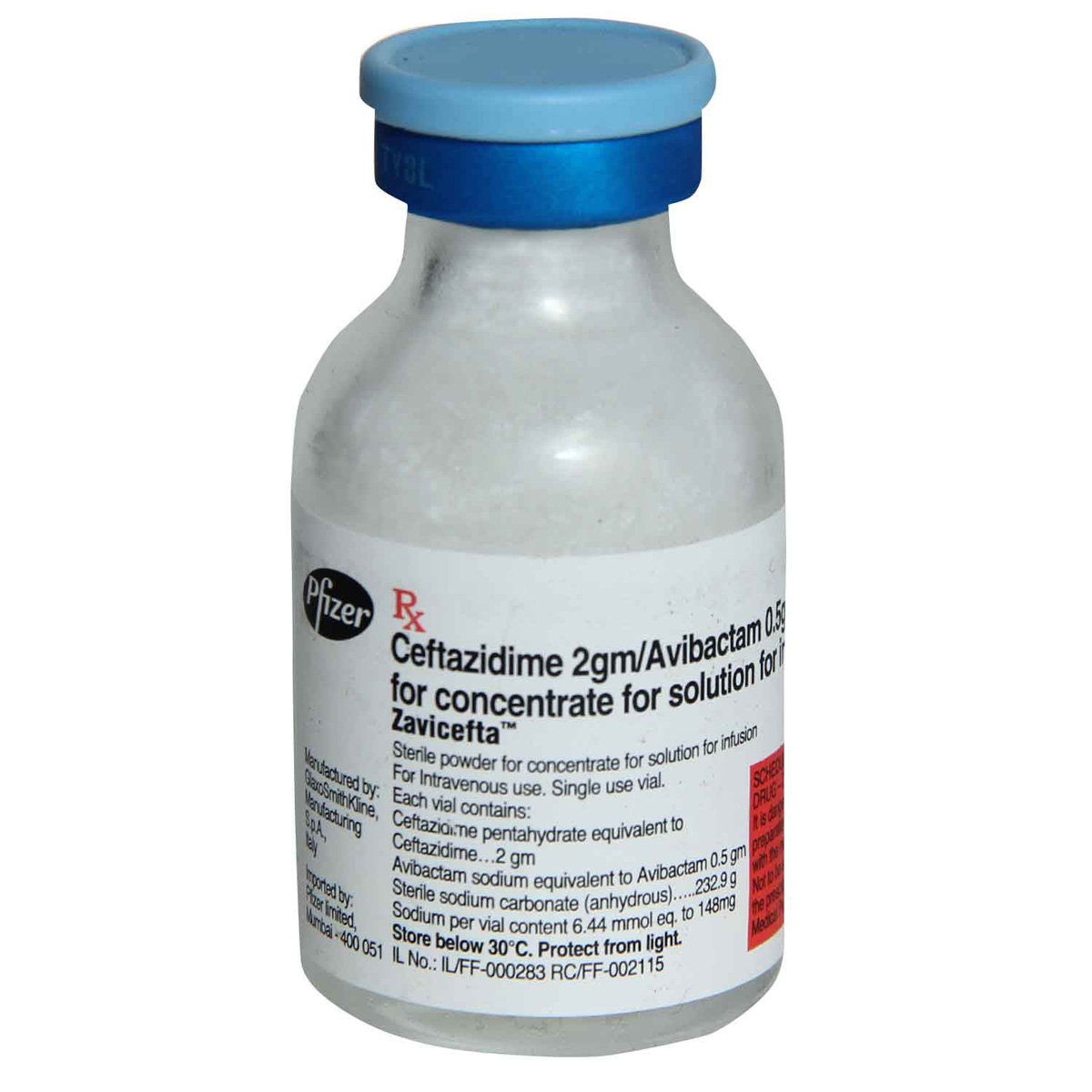Avictum 2.5 gm Injection

MRP ₹5612
(Inclusive of all Taxes)
₹841.8 Cashback (15%)
know your delivery time
Provide Delivery Location
Composition :
Manufacturer/Marketer :
Consume Type :
Expires on or after :
Return Policy :

Secure Payment

Trusted by 8 Crore Indians

Genuine Products
Therapeutic Class
Country of origin
Manufacturer/Marketer address
Disclaimer
Alcohol
Safe if prescribed
The interaction of Avictum 2.5 gm Injection with alcohol is unknown. Please consult a doctor before consuming alcohol while using Avictum 2.5 gm Injection.
Pregnancy
Consult your doctor
Please consult a doctor if you are pregnant or planning for pregnancy. Your doctor will prescribe only if the benefits outweigh the risks.
Breast Feeding
Consult your doctor
Avictum 2.5 gm Injection may be excreted in human milk in small amounts. Therefore, it is given to breastfeeding mothers only if the doctor thinks benefits are greater than risks. Please consult a doctor if you are breastfeeding.
Driving
Safe if prescribed
Avictum 2.5 gm Injection may cause dizziness. Therefore, avoid driving if you feel dizzy after taking Avictum 2.5 gm Injection.
Liver
Consult your doctor
Take Avictum 2.5 gm Injection with caution, especially if you have a history of liver diseases/conditions. The dose may be adjusted by your doctor as required.
Kidney
Consult your doctor
Take Avictum 2.5 gm Injection with caution, especially if you have a history of kidney diseases/conditions. The dose may be adjusted by your doctor as required.
Children
Safe if prescribed
Avictum 2.5 gm Injection should be used in children only in doses as prescribed by a doctor. Avictum 2.5 gm Injection is not recommended for use in children below 3months.
Product Substitutes
Reference
- https://journals.asm.org/doi/full/10.1128/AAC.03057-14
- https://www.medicines.org.uk/emc/medicine/33061#gref
- https://en.wikipedia.org/wiki/Ceftazidime
- https://www.ema.europa.eu/en/documents/product-information/zavicefta-epar-product-information_en.pdf
- https://en.wikipedia.org/wiki/Ceftazidime/avibactam
- https://pubmed.ncbi.nlm.nih.gov/29671219/
- https://www.avycaz.com/
- https://www.accessdata.fda.gov/drugsatfda_docs/label/2015/206494s000lbl.pdf
- https://pubmed.ncbi.nlm.nih.gov/25022578/#:~:text=Avibactam%20has%20an%20unusual%20mechanism,inhibitors%2C%20this%20reaction%20is%20reversible.
- https://journals.asm.org/doi/full/10.1128/AAC.03057-14
- https://www.medicines.org.uk/emc/files/pil.275.pdf
- https://www.drugs.com/cdi/ceftazidime.html
- https://www.webmd.com/drugs/2/drug-1769/ceftazidime-injection/details
- https://www.webmd.com/drugs/2/drug-167890/ceftazidime-avibactam-intravenous/details
About Avictum 2.5 gm Injection
Avictum 2.5 gm Injection belongs to a class of medicines called antibiotics used in the treatment of bacterial infections of the urinary tract, respiratory tract and abdomen. A bacterial infection is a condition in which harmful bacteria grow in the body and cause infection. Bacteremia is the presence of bacteria in the blood.
Avictum 2.5 gm Injection contains Ceftazidime and Avibactam. Ceftazidime works by interfering with the formation of the bacterial cell wall (a protective covering) that is necessary for their survival. Avibactam decreases bacterial resistance and enhances the activity of Ceftazidime against the bacteria. Together, Avictum 2.5 gm Injection helps to treat bacterial infections.
In some cases, you may experience redness and swelling at the site of injection, and/or nausea and diarrhoea. Most of these side effects of Avictum 2.5 gm Injection do not require medical attention and gradually resolve over time. However, if the side effects persist or worsen, please consult your doctor.
If you are allergic to Avictum 2.5 gm Injection or any other medicines, please tell your doctor. If you are pregnant or breastfeeding, please inform your doctor before taking Avictum 2.5 gm Injection. Drive only if you are alert as Avictum 2.5 gm Injection may cause dizziness. Avictum 2.5 gm Injection should be used with caution in those with renal impairment and Clostridium difficile-associated diarrhoea.
Uses of Avictum 2.5 gm Injection
Medicinal Benefits Mweb
Key Benefits
Avictum 2.5 gm Injection contains Ceftazidime and Avibactam; they act against both aerobic (grow in the presence of oxygen) and anaerobic (grow in the absence of oxygen) gram-negative and gram-positive bacteria. It is used in the treatment of bacterial infections of the urinary tract, respiratory tract, and abdomen. Ceftazidime inhibits enzymes that regulate the formation of the bacterial cell wall, thereby arresting bacterial development. Avibactam is a beta-lactamase inhibitor. Beta-lactamase is an enzyme that inactivates antibiotics and builds up a drug resistance. By inhibiting beta-lactamase, avibactam makes the bacteria more susceptible to antibiotic action. Avictum 2.5 gm Injection damages the bacterial cell wall, kills bacteria and makes the bacteria more sensitive to the action of the antibiotic. Hence Avictum 2.5 gm Injection finds widespread use in treating complicated bacterial infections.
Directions for Use
Side Effects of Avictum 2.5 gm Injection
- Redness and swelling on injection site
- Diarrhoea
- Dizziness
- Nausea
Drug Warnings
If you are allergic to Avictum 2.5 gm Injection or any other medicines, please tell your doctor. If you have kidney problems or diabetes, inform your doctor before taking Avictum 2.5 gm Injection. Consult your doctor if you are pregnant or breastfeeding. If you are on a controlled sodium diet, inform your doctor before taking Avictum 2.5 gm Injection. Avictum 2.5 gm Injection should not be administered if you are currently on any vaccinations or are scheduled for the same. If you have a widespread rash with peeling skin and blisters, please consult a doctor immediately as these might be signs of Stevens-Johnson syndrome. Drive only if you are alert as Avictum 2.5 gm Injection may cause dizziness. You are recommended to complete the full course of Avictum 2.5 gm Injection as prescribed by your doctor for effective results.
Drug-Drug Interactions
Drug-Drug Interactions
Login/Sign Up
When BCG vaccine is used with Avictum 2.5 gm Injection, its effectiveness may be reduced.
How to manage the interaction:
Taking Avictum 2.5 gm Injection with BCG vaccine is not recommended, but can be taken together if prescribed by a doctor. In case you experience any unusual side effects, consult a doctor. Do not discontinue any medications without consulting a doctor.
Taking the cholera vaccine after or along with Avictum 2.5 gm Injection may reduce the activity of the vaccine.
How to manage the interaction:
Although there is a possible interaction between Avictum 2.5 gm Injection and Cholera vaccines, you can take these medicines together if prescribed by your doctor. You should wait at least 14 days after finishing your antibiotic treatment before receiving the cholera vaccine in order to ensure an appropriate immune response. Do not stop using any medications without consulting a doctor.
Taking the cholera vaccine after or along with Avictum 2.5 gm Injection may reduce the activity of the vaccine.
How to manage the interaction:
Although taking Avictum 2.5 gm Injection with Cholera, live attenuated can possibly result in an interaction, but it can be taken if your doctor has advised it. You should wait at least 14 days after finishing your antibiotic treatment before receiving the cholera vaccine in order to ensure an appropriate immune response. Do not stop using any medications without a doctor's advice.
Drug-Food Interactions
Drug-Food Interactions
Login/Sign Up
Drug-Diseases Interactions
Drug-Diseases Interactions
Login/Sign Up
Drug-Drug Interactions Checker List
- PROBENECID
- CHLORAMPHENICOL
- TOBRAMYCIN
- GENTAMICIN
- FUROSEMIDE
Habit Forming
Special Advise
- Regular kidney function tests are recommended, especially in patients with kidney problems while taking Avictum 2.5 gm Injection so that the dose may be adjusted accordingly.
- If you are about to undergo any blood or urine tests, inform your doctor that you are taking Avictum 2.5 gm Injection as it may interfere with these tests.
- Avictum 2.5 gm Injection may interact with certain tests such as glucose (sugar) in urine and coomb’s test (blood test), resulting in unusual results. Therefore, inform the lab technician that you are taking Avictum 2.5 gm Injection before undergoing any tests.
Diet & Lifestyle Advise
- Take probiotics after completing the full course of Avictum 2.5 gm Injection to restore some healthy bacteria in the intestines that may have been killed. Taking probiotics after antibiotic treatment can reduce the risk of antibiotic-associated diarrhoea. Certain fermented foods like cheese, yoghurt, kombucha, sauerkraut and kimchi can help to restore the good bacteria of the intestine.
- Include fibre-rich foods, as they can be easily digested by your gut bacteria, which helps stimulate their growth. Whole grains such as whole-grain bread, brown rice should be included in your diet.
- Make sure you drink plenty of water or other fluids every day while you are taking Avictum 2.5 gm Injection.
- Avoid alcohol consumption as it may increase adverse effects.
All Substitutes & Brand Comparisons
RX
Out of StockNot for online saleInfegam 2 gm/0.5 gm Injection 1's
Biocon Ltd
₹1499
(₹1499.0 per unit)
67% CHEAPERRX
Not for online saleZilias Injection 1's
Intas Pharmaceuticals Ltd
₹2700
(₹2214.0 per unit)
51% CHEAPERRX
Not for online saleZivictam Injection 1's
Converge Biotech Pvt Ltd
₹4564.5
(₹3742.9 per unit)
18% CHEAPER

Have a query?
Buy best Infections & Infestation products by
Cipla Ltd
Macleods Pharmaceuticals Ltd
Alkem Laboratories Ltd
Lupin Ltd
Abbott India Ltd
Sun Pharmaceutical Industries Ltd
Mankind Pharma Pvt Ltd
Micro Labs Ltd
Aristo Pharmaceuticals Pvt Ltd
FDC Ltd
Intas Pharmaceuticals Ltd
Glenmark Pharmaceuticals Ltd
Ipca Laboratories Ltd
Torrent Pharmaceuticals Ltd
Zydus Healthcare Ltd
Biochem Pharmaceutical Industries Ltd
Zuventus Healthcare Ltd
United Biotech Pvt Ltd
Hetero Drugs Ltd
Emcure Pharmaceuticals Ltd
Alembic Pharmaceuticals Ltd
Indoco Remedies Ltd
Fusion Health Care Pvt Ltd
Dr Reddy's Laboratories Ltd
Leeford Healthcare Ltd
Cadila Healthcare Ltd
Wockhardt Ltd
Zydus Cadila
GlaxoSmithKline Pharmaceuticals Ltd
Morepen Laboratories Ltd
Blue Cross Laboratories Pvt Ltd
Cadila Pharmaceuticals Ltd
Converge Biotech Pvt Ltd
Elder Pharmaceuticals Ltd
Hetero Healthcare Pvt Ltd
Pfizer Ltd
AAA Pharma Trade Pvt Ltd
Gufic Bioscience Ltd
Mylan Pharmaceuticals Pvt Ltd
Corona Remedies Pvt Ltd
Wallace Pharmaceuticals Pvt Ltd
Apex Laboratories Pvt Ltd
Medishri Healthcare Pvt Ltd
Akumentis Healthcare Ltd
Alniche Life Sciences Pvt Ltd
Hegde & Hegde Pharmaceutica Llp
Veritaz Healthcare Ltd
Ranbaxy Laboratories Ltd
Koye Pharmaceuticals Pvt Ltd
Shreya Life Sciences Pvt Ltd
Overseas Health Care Pvt Ltd
Biocon Ltd
Indchemie Health Specialities Pvt Ltd
Medley Pharmaceuticals Ltd
Brinton Pharmaceuticals Ltd
J B Chemicals & Pharmaceuticals Ltd
Unifaith Biotech Pvt Ltd
Ajanta Pharma Ltd
Biochemix Health Care Pvt Ltd
Natco Pharma Ltd
Samarth Life Sciences Pvt Ltd
Unichem International
Laborate Pharmaceuticals India Ltd
Unipark Biotech Pvt Ltd
Zymes Bioscience Pvt Ltd
Indiabulls Pharmaceuticals Pvt Ltd
Neon Laboratories Ltd
Vasu Organics Pvt Ltd
DR Johns Lab Pharma Pvt Ltd
East West Pharma India Pvt Ltd
La Renon Healthcare Pvt Ltd
Medgen Drugs And Laboratories Pvt Ltd
Novartis India Ltd
Canixa Life Sciences Pvt Ltd
Icarus Health Care Pvt Ltd
Lincoln Pharmaceuticals Ltd
Celon Laboratories Pvt Ltd
Concept Pharmaceuticals Ltd
Klm Laboratories Pvt Ltd
Nicholas Piramal India Ltd
Systopic Laboratories Pvt Ltd
Yuventis Pharmaceuticals
Capital Pharma
German Remedies Ltd
Pristine Pearl Pharma Pvt Ltd
Unison Pharmaceuticals Pvt Ltd
Aurz Pharmaceutical Pvt Ltd
Clover Health Care Pharma
Kepler Healthcare Pvt Ltd
Allites Life Sciences Pvt Ltd
Auspharma Pvt Ltd
Intra Life Pvt Ltd
Jolly Healthcare
Linux Laboratories Pvt Ltd
Ozone Pharmaceuticals Ltd
Cachet Pharmaceuticals Pvt Ltd
Comed Chemicals Ltd
Delcure Life Sciences Ltd
Fresenius Kabi India Pvt Ltd
Khandelwal Laboratories Pvt Ltd



